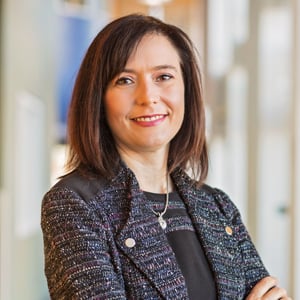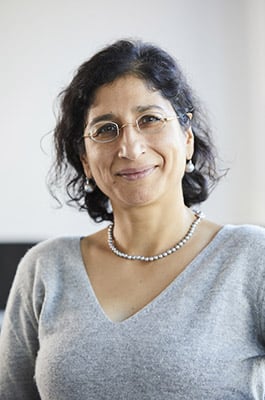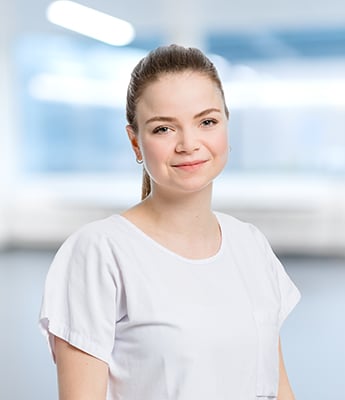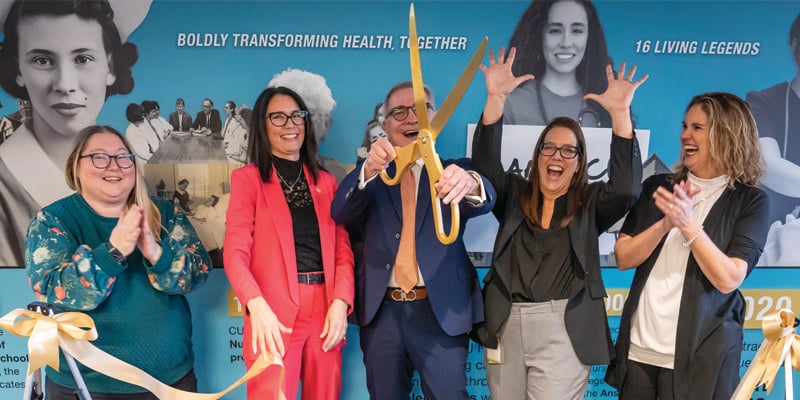The University of Colorado College of Nursing at the CU Anschutz Medical Campus is collaborating with the Bern University of Applied Sciences in Switzerland and making history. CU Nursing is teaching Swiss nurses advanced practice nursing skills to meet a critical shortage of healthcare professionals facing an aging, sicker population.
The Associate Dean of Academic Programs at CU Nursing helped create a new Master of Science in Nursing program at Bern which allows students to earn an advanced degree in four tracks: adult-gerontology nurse practitioner in primary care, as well as assisting with the nurse practitioner in mental health, clinical nurse specialist and nurse practitioner in adult gerontology curriculums. CU faculty contribute to the teaching courses to Swiss students online.

Kelly Stamp, PhD, NP-C, associate dean of Academic Programs, and associate professor at CU Nursing |
The program was created in 2019 after Kelly Stamp, PhD, NP-C, RN, CHFN, FAHA, FAAN, associate dean of Academic Programs, and associate professor at CU Nursing met faculty in Switzerland and learned about the shortage of general practitioners (GPs) in rural areas.
It is projected that by 2030, Switzerland will need between about 8500 more doctors or 37% more than today. The shortfall is due to retiring doctors, the demand for medical care from an aging population, and a rise in chronic illnesses, according to studies. The Swiss government admits that educating that many physicians in a short time is almost impossible. That’s why new healthcare delivery models are needed, including advanced nurse practitioners.
“These advanced nurse practitioners can be based in the rural health system in the mountains, help with primary care, help with access to care, and help those who really can’t afford a lot of care,” said Dr. Stamp.
“The role of nurse practitioners is not in competition with physicians in Switzerland, it is in complement with physicians. Just like in the United States, we're not trying to be physicians, we're trying to improve patient outcomes and complement the role.”

Maya Zumstein-Shaha, PhD, MSCN, RN, FAAN, professor at Bern University of Applied Sciences |
Stamp’s partner in the collaboration is Maya Zumstein-Shaha, PhD, MSCN, RN, FAAN, professor at Bern University of Applied Sciences.
“This is a game changer for both of us,” said Dr. Maya Zumstein-Shaha. “It’s a great opportunity for students to expand their technical skills, their manual skills of approaching and dealing with patients and to really start combining their extended nursing knowledge together with medical knowledge, which they previously wouldn’t be able to do.”
Until this particular master of science class, nurses in Switzerland predominantly worked in hospitals. Nurses in GP practices were unusual, leaving the burden of assessing and caring for patients solely on doctors.
“We have a painful shortage of well-educated professionals in nursing, amongst physicians and among other healthcare professionals as well. We usually just shove everything to the physician, who is then completely overwhelmed,” said Zumstein-Shaha.
The Switzerland of America
CU Nursing is the perfect university to pioneer the program with Bern. It resides in Colorado which is nicknamed the “Switzerland of America” because of its majestic mountains, skiing and natural beauty like Switzerland.
In 1965, when CU Nursing started the nation’s first nurse practitioner program, it was also to fill a need for medical care in rural areas. In the 1960s, the university started teaching advanced practice roles with the first nurse practitioner program being a pediatric nurse practitioner developed by Dr. Loretta Ford. Nursing in Switzerland has followed the same path, albeit decades later.
Since the master of science in nursing program began three years ago, it has become the largest program in Switzerland with more than 70 students a year attending courses. In a commencement speech, Stamp congratulated the 2021 and 2022 graduating classes.
“All of you are pioneers in nursing. You are making history! You are one of the first to represent your profession to other healthcare professionals within and outside of nursing. Think about how you are showing the value of the nurse practitioner role in your practice settings,” Stamp told the graduates.
“Make no doubt that you are part of nursing history in Switzerland and for that, you do have an awesome responsibility, but with that comes great possibility. You are paving the way for nurses who come behind you. You will be the ones to save lives and be that special person in your patients’ lives.”
The graduate

Lea Flueck, MSNP, RN, graduate of Bern University of Applied Sciences |
One of the graduates listening to Stamp’s speech that day was Lea Flueck. She says the degree has given her a lot of insight into how different healthcare systems work and the potential for nurses to take on greater roles in Switzerland.
“It was good to hear what they are doing in the U.S. and learn about their skills and what they are allowed to do. It pushed me to think over the way it works right now in Switzerland and it gave me new perspectives,” said Flueck, MSNP, RN, graduate of Bern University of Applied Sciences.
“The physician shortage is driving a change. And yet, it is difficult to guarantee basic care in the new future. So, I don't think the use of highly trained nurses is only necessary in primary care or in rural areas. For me, highly trained nurses are necessary in every part of the healthcare system.”
As part of the Master of Science in Nursing program, Flueck interned in a rural area. For the first time, those patients came in contact with a Nurse Practitioner while being treated jointly with a primary care physician.
“Based on my experience, the patients were very open to my new role. I would say the patients highly appreciate the treatment they get, no matter if it’s a doctor or a nurse. They were very open to me and they enjoyed being able to spend more time talking.”
All for one and one for all
Both universities expect the new role for nurses will benefit everyone; the nurses who are learning and able to practice more, the doctors who are getting more help, and the patients who are still getting quality care.
“The patients will benefit from a very well-trained person who's actually graduated in a second academic degree, namely the Master of Science in Nursing, and as such, has a really big backpack of knowledge which they can bring to the table to help patients better cope with their situation, support them in their self-management, and provide health prevention education,” said Zumstein-Shaha.
“Patients will get better and more tailored care, more evidence-based care as well. These nurses will be able to support other nursing team members with knowledge, will weigh how to do things and look at things and also be able to relieve physicians and other healthcare professionals in terms of what is really necessary to do.”
The new degree is also a breakthrough in the way universities work together to improve healthcare anywhere in the world.
“We discovered that although we are two very different countries, size-wise, where we are located, how we speak, how we eat, is all very different, but there are still many similarities. And that was an eye-opener for both of us,” said Zumstein-Shaha.
CU Nursing faculty say the experience of working together has been wonderful.
“I think we all have the same problems even though we have different healthcare systems. People are people and they have different financial abilities and access to care. How do we build a role to help with improving patient outcomes through a nurse practitioner role and have that complement a physician’s role that will make all of the difference? We've got a long way to go. But that's when I talk about possibilities. I don't see it as overwhelming and that we can't get there. I see it as being an unlimited possibility,” said Stamp.



